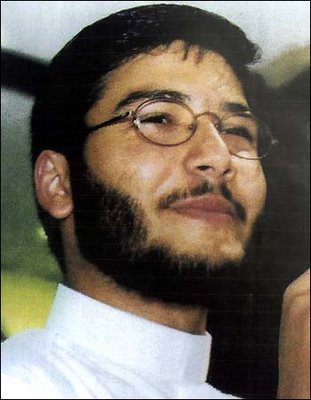
U.S. Muslim Gets 30 Years for Plot to Assassinate President Bush
Wednesday, March 29, 2006
ALEXANDRIA, Va. — American Muslim was sentenced Wednesday to 30 years in prison for joining Al Qaeda and plotting to assassinate President Bush.
ALEXANDRIA, Va. — American Muslim was sentenced Wednesday to 30 years in prison for joining Al Qaeda and plotting to assassinate President Bush.
Prosecutors had asked for the maximum — a life sentence — for Ahmed Omar Abu Ali, a 25-year-old U.S. citizen who was born to a Jordanian father and raised in Falls Church, Va.
"The facts of this case are still astonishing," prosecutor David Laufman said. "Barely a year after Sept. 11 the defendant joined the organization responsible for 3,000 deaths."
"The facts of this case are still astonishing," prosecutor David Laufman said. "Barely a year after Sept. 11 the defendant joined the organization responsible for 3,000 deaths."
But U.S. District Judge Gerald Bruce Lee said 30 years was sufficient punishment. He compared the Abu Ali case to "American Taliban" John Walker Lindh, who received a 20-year sentence.
Abu Ali's actions "did not result in one single actual victim. That fact must be taken into account," the judge said.
Abu Ali, wearing a green prison jumpsuit, declined to speak before his sentence was imposed. Defense lawyers said they plan to appeal.
Prosecutors said Abu Ali traveled to Saudi Arabia and joined Al Qaeda out of hatred for the United States. The Saudis arrested Abu Ali in June 2003 as he was taking final exams at the Islamic University of Medina.
Ali was convicted in November of conspiracy to assassinate the president, conspiracy to hijack aircraft and providing support to Al Qaeda, among other crimes. The charges carried a mandatory sentence of at least 20 years behind bars.
Abu Ali gave the Saudis a statement in which he said that he joined Al Qaeda and discussed with some of the most senior Al Qaeda members terror plots, including Bush's assassination, and plans to establish an Al Qaeda terror cell in the U.S.
He claimed that the Saudis had extracted a confession from him through torture. Prosecutors denied he was mistreated.
Abu Ali said he had the scars on his back that proved he was whipped or beaten by the Saudis. Pictures were taken of his back, and doctors for both the government and the defense examined him, coming to different conclusions.
The jury in the three-week trial saw a videotaped confession Abu Ali gave to the Saudis in which he said he joined Al Qaeda because he hated the United States for its support of Israel.
In February, defense lawyers asked for a review of the conviction in light of the disclosure that the Bush administration had eavesdropped on suspected terrorists' conversations without search warrants. Abu Ali's lawyers said they suspected, but had no firm evidence, that Abu Ali had been a target of the surveillance program.
In February, defense lawyers asked for a review of the conviction in light of the disclosure that the Bush administration had eavesdropped on suspected terrorists' conversations without search warrants. Abu Ali's lawyers said they suspected, but had no firm evidence, that Abu Ali had been a target of the surveillance program.
The government's response was not made public, but the judge decided to go ahead with the sentencing after receiving it.

No comments:
Post a Comment